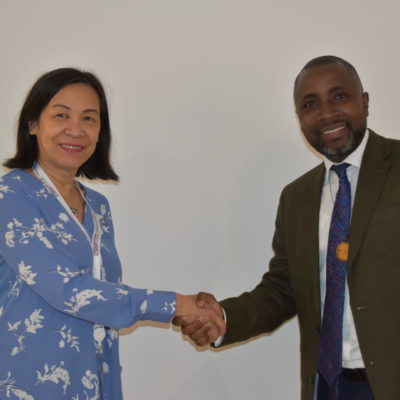Last week, Free the Slaves was among 17 organizations that co-signed a letter to Secretary of State Hillary Clinton, urging her to make the eradication of slavery and human rights abuses in Congo a U.S. government priority.
Read Free the Slaves Director of Programs Karen Stauss’ account of visiting Congo mines.
Recent passage of the Conflict Minerals Act (which was bundled into the Dodd-Frank, Wall Street reform legislation) requires companies to disclose to the Securities and Exchange Commission (SEC) what they are doing to keep human rights abuses out of our supply chains. Free the Slaves wants to ensure that slavery isn’t overlooked. We have already urged the SEC to monitor for slavery in Congo mineral supply chains—but we need your help. Please sign our petition urging the SEC to monitor for slavery in Congo mines.
The co-signers of this letter include human rights NGOs and socially responsible investment firms. Read it in full after the jump, or download the PDF here.
Dear Madam Secretary:
We, the undersigned, write in regard to one of the greatest humanitarian crises of the 21st century and the deadliest conflict since World War II. The conflict in Congo has spawned enormous human rights abuses and mass atrocities that have been widely documented.
For the past year an informal multi-stakeholder group, composed of representatives from affected industry, NGOs, human rights organizations, and socially responsible investor groups, has been meeting to discuss solutions to the ongoing atrocities in the Congo and contributed to the content of this letter. We believe that the Obama administration can play a decisive role in building on existing efforts to bring about lasting peace, stability, and sustainable development in the Congo and the Great Lakes region of Africa.
We call on the Department of State to prioritize diplomatic efforts required under current U.S. law, including the Dodd-Frank Act and the Democratic Republic of the Congo Relief, Security, and Democracy Promotion Act (Public Law 109-456). The Obama Administration can best advance peace and stability in the Congo and the region by taking the following steps:
– Create a leadership role for the U.S. on certification of conflict minerals. Increase involvement within regional processes, such as the International Conference on the Great Lakes Region (ICGLR) and the PROMINES initiative, and ensure a unified, credible and sustainable system that provides positive incentive to trade in clean minerals. The USG has a significant window of opportunity to catalyze a credible certification process for conflict minerals, as regional governments are now moving on the issue through the ICGLR process. Multiple initiatives have begun work on the ground in Congo and the region to trace minerals from mines to export points; however, these individual, separate steps will not be sufficient to end the conflict minerals trade.
– Propose the adoption of an all-inclusive political framework for dialogue to the regional heads of state, especially leaders of Congo, Rwanda, and Uganda; belligerent forces; and civil society, particularly Congolese women’s groups.
– Appoint a Special Envoy to the Great Lakes, as required under P.L. 109-456. Ensure that the State Department’s efforts are actively coordinated with other USG agencies to maximize impact.
– Implement a coherent approach to security sector reform (SSR) by coordinating a clear partnership both among donors and between donors and Congolese authorities under a common strategic framework. The framework should link continued aid to the following benchmarks:
• human rights accountability and vetting of senior commanders; • transparent payment of soldiers, including separation of the chain-of-command
from the chain-of-pay; • increased support for political institutions that are responsible for regulating the
military and the judicial system; • proper training, including on human rights; and • implementation of SSR as a nationally-led process, including by drawing in civil
society, parliamentarians and the media, engaging with reform plans proposed by Congolese authorities and drawing on expertise and influence from regional civil society and religious leaders.
– Support the elimination of modern slavery, sexual and gender-based violence and other extreme violations of human rights in and around mining sites:
• Ensure that the monitoring and elimination of human rights abuses, including modern slavery and sexual and gender-based violence, are included within the State Department’s plan to address DRC conflict minerals, including within its plan to provide guidance to commercial entities (see Dodd-Frank Act, Sec. 1502(c)(1)(B)(ii)). The processes related to certification and traceability mechanisms should take account of the need to assure that these abuses are not taking place.
– Support economic development through Department and USAID programs to:
• Reinvigorate small-scale agricultural production by facilitating the return of displaced rural populations to their farms and villages, which in turn depends on good security conditions and, relatedly, resolution of land tenure disputes.
• Invest in infrastructure, particularly roads and water management, and agricultural extension services. Roads in particular are crucial to sustainable development and would enable regular monitoring and remediation of human rights abuses including slavery and sexual violence.
• Provide grants to enable improvements in DRC mining processes and to improve access to health, education, including rights-based education, and employment in artisanal mining communities. These grants will empower communities in a positive cycle to demand further improvements in governance and help to protect them from abuse.
• Development and humanitarian assistance programs in mining areas should ensure that especially vulnerable community members and workers are identified and supported.
We firmly believe that our combined actions can accelerate the end to what is the deadliest conflict in the world. Madam Secretary, with your leadership we can halt the mass deaths, rapes and slavery if we all act now and act swiftly. We respectfully request a meeting with you in order to discuss further these issues. To arrange this, please contact Karen Stauss, Director of Programs at Free the Slaves, at 202-775-7480 (karen.stauss@freetheslaves.net). Thank you for your attention to this urgent matter.
Sincerely:
Africa Faith and Justice Network Boston Common Asset Management, LLC Calvert Asset Management Company, Inc. The Enough Project Falling Whistles Firstborn Advisors L.L.C. Free the Slaves Friends of the Congo Future 500 Interfaith Center on Corporate Responsibility Jantzi-Sustainalytics Jesuit Conference Jewish World Watch Pact Responsible Sourcing Network Trillium Asset Management Tri-State Coalition for Responsible Investment
Cc:
Robert Hormats, Under Secretary, Economic, Energy and Agricultural Affairs Maria Otero, Under Secretary, Democracy and Global Affairs Amb. Melanne Verveer, Ambassador-at-Large for Global Women’s Issues Amb. Johnnie Carson, Assistant Secretary of State, Bureau of African Affairs Amb. Luis CdeBaca, Ambassador-at-Large to Monitor and Combat Trafficking in
Persons Karl Wycoff, Deputy Assistant Secretary of State, Bureau of African Affairs Siria Lopez, Acting Director, Office of Central African Affairs Christopher Lamora, Acting Deputy Director, Office of Central African Affairs Sharon Cromer, USAID, Senior Deputy Assistant Administrator



